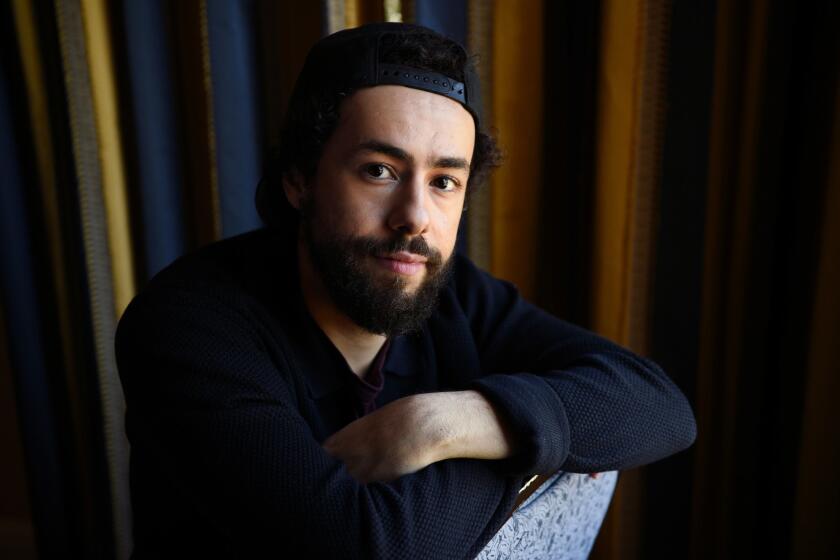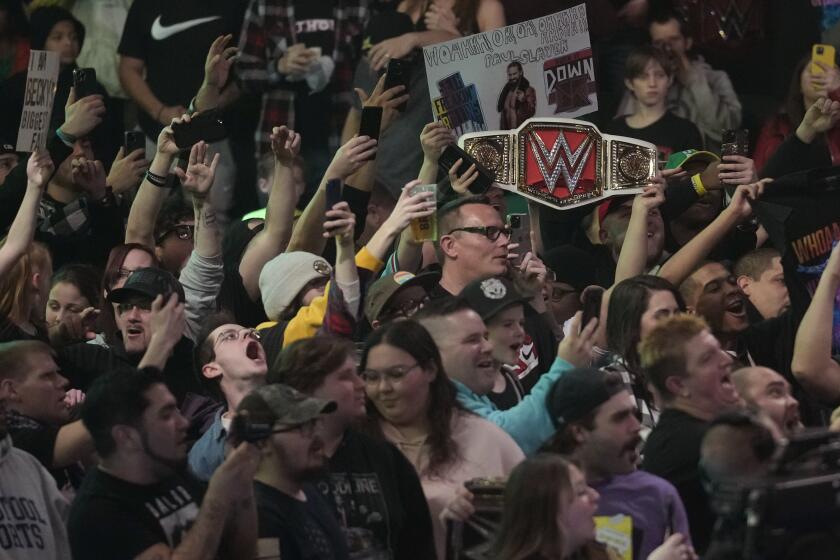Review: ‘Ramy’s’ second season pulls off a miracle: It’s even better than the first
Questions about faith and purpose abound when Hulu’s Muslim American millennial comedy “Ramy” returns Friday with a new season and Mahershala Ali as a spiritual guide.
The stakes are high for Season 2 of the series, which is written, cocreated and executive produced by star Ramy Youssef, a 29-year-old comedian who won a Golden Globe in January for his performance in the freshman season of his breakthrough comedy. It was TV’s first Arab immigrant sitcom, tackling American life inside the Islamic Center and sex in cars with strangers with equal aplomb. Its success surprised just about everyone — including Youssef himself.
The new season, premiering Friday on Hulu, expands upon the comedic dexterity and unexpected depth of its predecessor, finding humor in places often used to inspire fear (the mosque) and tapping universal themes of hope and belonging in scenarios specific to Ramy’s small world. It is, miraculously, as good — if not better than — its predecessor.
As Season 2 begins, Ramy Hassan (Youssef) is mired in a deep depression. His Season 1 search for meaning was a bust. Now the New Jersey-based son of Egyptian immigrants is sleeping until midday, sustaining himself with junk food and porn and hasn’t spoken to his friends since returning from the motherland, where he sought spiritual guidance but ended up sleeping with his cousin instead.
Sex outside of marriage. Sex inside of cars. Sex as a 24-7 preoccupation.
“Dude, get out of bed,” advise his friends Ahmed (Dave Merheje), Mo (Mohammed Amer) and Stevie (Stephen Way). “You look like [crap] . You’re somehow fatter and thinner at the same time.” They’re worried about him, and he’s worried they’ve been talking about him with his mom and his imam. It’s enough to get him moving. His quest to be a better person guides him to a new Islamic Center, led by an inspiring Sufi imam: “He’s so fuego, dude,” says his white convert friend. “The Sheikh is radical. Like cool radical. Not radical, radical.”
Sheikh Ali is played by the eloquent and utterly convincing Ali, who adds gravity to the series while playing into the humor spun from Ramy’s various misadventures. He’s the discipline to Ramy’s impulse, the peace to Ramy’s conflict. They form an unlikely duo, playing off each other with brutally funny subtlety and undeniable warmth.
When the two first meet for a council session, Ramy explains there’s a hole inside him. “I tried to fill it with God, but I don’t know how,” he says. “I only ever think about me [and porn], and I hate it. ... I want you to be my teacher. I want to kill my ego.”
“How do I know I’m not just another one of your desires?” asks the Sheikh.
“I don’t want to have sex with you.”
“I did not think you did,” answers Ali, somehow with a straight face.
There are so many small moments in the new episodes that have big meaning, and garner big laughs, while the show continues to push boundaries. “Ramy” expands its commentary on faith, assimilation and coming of age in an American landscape that’s changing by the hour. Its fresh, entertaining perspective on religious radicalism, black Muslims, white converts and everything else once deemed a threat by “Homeland” is still a feat to behold. And it works on myriad levels: Season 2 is moving and profane. Stupid funny, then scary serious. Topical and evergreen. Hyperspecific with wide appeal.
Critic Lorraine Ali writes of seeing her immigrant upbringing in the San Fernando Valley reflected in the Mindy Kaling Netflix comedy ‘Never Have I Ever.’
The returning cast include Ramy’s endearing, sometimes clueless mother, Maysa (Hiam Abbass), no-nonsense father, Farouk (Amr Waked), sarcastic sister Dena (May Calamawy) and his bigoted, diamond-merchant Uncle Naseem (Laith Nakli). The family again is a big part of the story. They’re also given room and attention to grow and learn from Ramy’s mistakes as well as their own experiences.
The crass Uncle Naseem now wants to make Ramy “a small little partner” in his jewelry store since realizing how much the customers like his nephew. “It’s 2020,” he explains. “They don’t want a man like me anymore. Trump [messed] it up too much. He’s too much a man, you know? The people are afraid. They want a man like you. A man who feels a little bit like a woman but is still officially a man. Maybe transsexual, you know?”
And the family’s exasperation with Ramy’s spiritual journey is evident at the dinner table. When he uncharacteristically suggests they pray before they eat, his immigrant father — who was likely raised to pray before all meals — holds back a laugh.
But when Ramy then suggests talking about “stuff we’re thankful for,” Dad’s had enough.
“Stop,” demands Farouk, then offers an additional unifying suggestion. “Tomorrow will be a great episode of ‘Shark’s Tank.’ ” he says. “We’ll watch it together.”
‘Ramy’
Where: Hulu
When: Any time
Rating: TV-MA (may be unsuitable for children under the age of 17)








